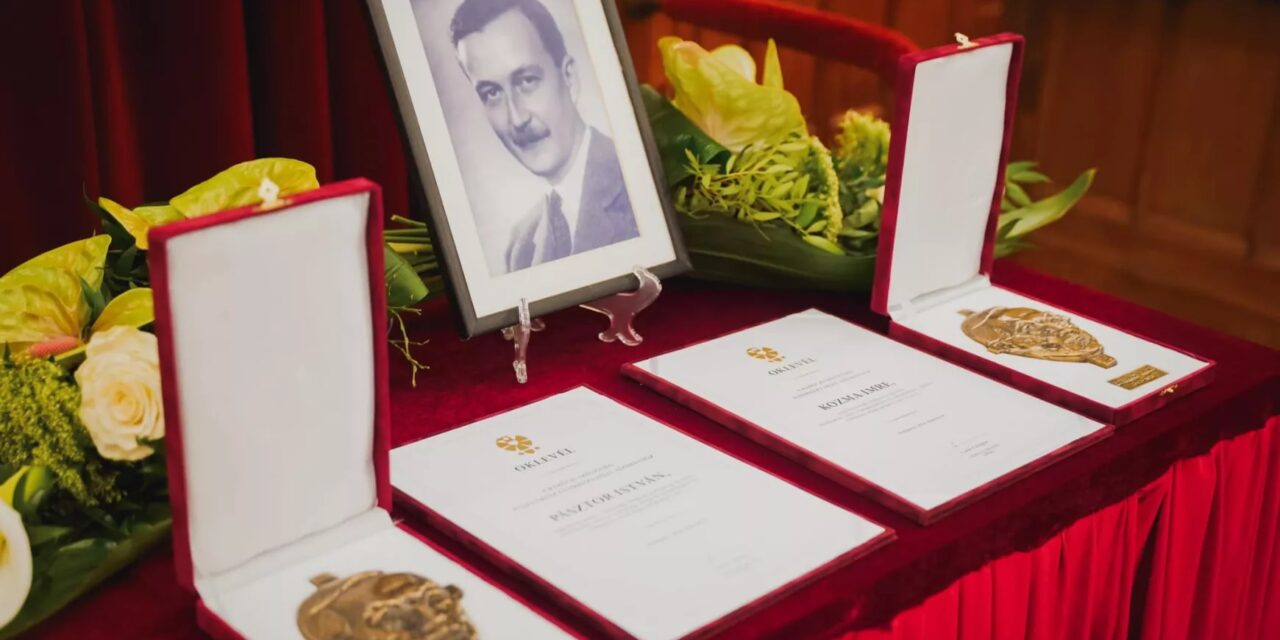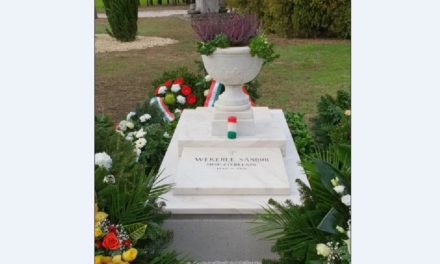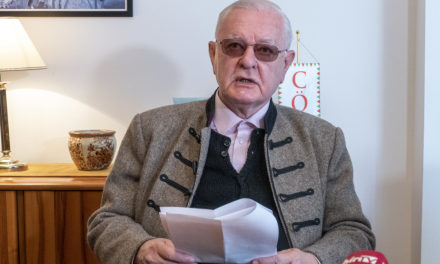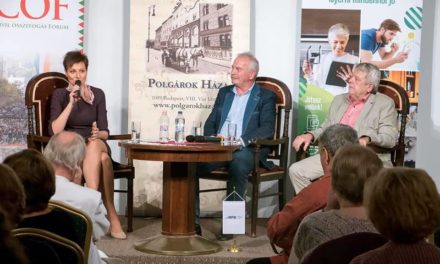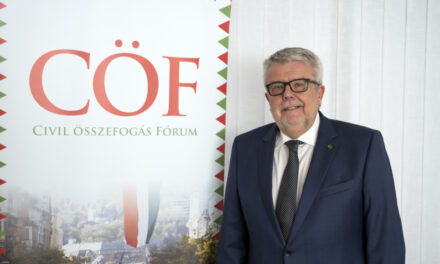Since 1991, the Rákóczi Association has been commemorating János Esterházy's life work in March every year, and has also been donating the Esterházy Prize.
On March 8, the Rákóczi Association commemorated the martyred politician János Esterházy in the upper chamber of the Parliament. The Esterházy Award was also presented at the event, which this year was given to Imre Kozma, a monk of the Order of Mercy. In addition, the late István Pásztor, a prominent Hungarian politician from Vojvodina, received a posthumous Esterházy Award.
Every March since 1991, the Rákóczi Association commemorates the life work of János Esterházy and grants the Esterházy Prize to persons or institutions who, in his spirit, have carried out outstanding activities in the service of the Hungarian communities, as well as for the preservation of the intellectual heritage of the martyred politician - for Christianity, the for all Hungarians and the peoples of Central Europe - they performed outstanding activities.
The legacy of János Esterházy
At the beginning of the memorial session, Miklós Panyi, Deputy Minister of the Prime Minister's Office, gave a speech on behalf of the Hungarian government, at the beginning of which he stated that János Esterházy's life was always determined by Christianity, Europeanism and belonging to the nation.
These are frameworks that were the most natural and defining constituent units of Europe. Such cultural and moral foundations, on which the continent was organically built for hundreds of years, and which foundations determined the life, social and economic organization of all great nations"
said the deputy minister, adding that this idea based on Christian values also meant a kind of European unity, which everyone recognized, respected and demanded.
However, the two great wars of the 20th century and the two great dictatorships resulting from them wanted to destroy everything in this world: God, nation, culture and the European man himself.
However, there were those who did not passively watch all this destruction, oppression, tearing the fabric of Europe to pieces. They took action against the anti-Christian, anti-national and anti-human processes, accepted the persecution and, if necessary, paid for it with their lives. Such was János Esterházy, the greatest Hungarian politician of the 20th century, who was Christian, European and Hungarian"
said Miklós Panyi.
The deputy minister emphasized that Esterházy steadfastly defended the Hungarian minority in the highlands, which was torn across the border as a result of the Trianon decision, against the nationalist policy of the Czechoslovak state. And in the same way, he protected the members of those nations and minorities who suffered from exclusion and injustice. His spiritual legacy, creed, attitude and steadfastness are therefore still a compass for all of us today.
Without illusions, on the ground of realities
István Pásztor, the former president of the Vojvodina Hungarian Federation (VMSZ), who passed away last fall, received the posthumous Esterházy award this year for all his activities for the Hungarian community in Vojvodina and for Hungarian-Serbian relations. The late politician was praised by László Kövér, the Speaker of the Parliament.
At the beginning of his speech, the Speaker quoted the words of János Esterházy written on Easter 1944: "Life is not something limited to the existence of the individual, but the expression of eternity. The Creator has entrusted life to us so that we can be his co-creators in it. Creation is possible only in the direction of the good, the ideal. What goes against the good, the ideal, is sin and leads to downfall."
According to László Kövér, it was his confession and testimony that elevated János Esterházy to a statesman without a state, and said with him that our symbol is the cross, not the swastika or the hammer and sickle.
Today, in the person of István Pásztor, we pay tribute to an outstanding Hungarian leader whose political talent and virtues were not to be consumed by statelessness, but to be put directly at the service of two states and two nations, Hungary and Serbia, Hungarians and Serbs.
- stressed the president of the Parliament, adding that the late party leader knew: politics is also the art of reconciling perspectives, i.e. the realistic reconciliation of the capabilities rooted in the past with future possibilities.
"He wanted to serve the Hungarians in the south with all his might. He recognized and felt precisely the martyrdoms of his community rooted in the past, he knew the dangers looming before him, but he always passionately trusted in its future. He never deceived himself, nor did he do this to others. He was neither naive nor a futurist, but a devout realist."
The award was presented by Csongor Csáky, the president of the Rákóczi Association, and Zoltán Szilágyi, the vice-president of the association, to Bálint Pásztor, the son of the late István Pásztor, the new president of the VMSZ.
The power of presence
Imre Kozma, a monk of the Order of Mercy, also received the Esterházy Award for his work for the poor and the downtrodden, as well as Hungarians abroad. The awardee was praised by Miklós Vecsei, Prime Minister's Commissioner, Vice President of the Maltese Charity Service, who recalled in his speech the moments when Imre Kozma rushed to help those in need - be it East German refugees, victims of the Romanian Revolution or the South Slavic War, or those left alone across the border about Hungarians.
But we could see him celebrating Christmas with homeless people, listening to the complaints of gypsy people, offering his last consolation in the wards of the Irgalmasrendi Hospital and in many, many pictures among elderly and disabled people. And we could see it in remote parts of the world, in Sri Lanka after the tsunami, among the survivors of the earthquake in Pakistan, at drinking water centers built in slums in Africa."
- said Miklós Vecsei, who says that what these pictures have in common is the way Father Imre is present among people.
Not as a stranger, not as a helper, not as a professional good person. Anyone who meets Father Imre lives on as a stronger person. Because real presence leaves a mark, and what is perhaps even more important, it allows the yearning world to leave a mark on it.”
Imre Kozma was born on June 4, 1940 in Győrzámoly, Szigetközi. He lost his father when he was one year old, so he was raised by his mother and grandmother, while learning a lot about the simple but eternal truths of the world. In 1958, during the worst reprisals following the revolution, he entered the seminary, and through his teachers he was able to see the brilliance of the underground church. After being ordained as a priest, he became a chaplain in Dorog, and after a short detour in Zugliget, he built his community of university students, famous and feared in the eyes of the authorities, at the Franciscans in Pest. As a punishment, he returned to Zugliget, now as a parish priest.
"We had a place in Zugliget where it was good to arrive, where they called us by name, and they didn't want to change it, but it quickly became clear how much good we have. Despite all our mistakes and failures, they believed in us, and after a while we also believed in ourselves and others. They counted on me and we were always busy. Our work can be done together. As father Imre has said many times: our years have passed, they are not just past. He had no method. Was present. Presence has no methodology. And yes, it left a mark”
– the former student, Miklós Vecsei, recalled the old memories.
Anyone who was lucky enough to attend Father Imre's religion classes must have learned three basic lessons. The first is that Christianity is not a theory, but a practice. The second is that love covers many sins. And the third said that there is no life without taking risks."
After receiving the award, in his thank-you speech, Father Imre recalled the message of János Esterházy, saying that redemption conceived in suffering is a divine plan. And if we want to live a new life as redeemed people, then we need Esterházy's example.
Featured image: Rákóczi Association

